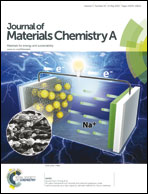Dual-dehydrogenation-promoted catalytic oxidation of formaldehyde on alkali-treated Pt clusters at room temperature†
Abstract
The activity of the Pt catalyst toward room-temperature catalytic oxidation of formaldehyde (HCHO) known as a common indoor air pollutant can be remarkably improved by the addition of some alkali metal salts. The resulting enhancement in the catalytic activity of the Pt catalyst is generally attributed to the introduction of alkali metal ions. Theoretical simulations and experimental studies presented here show that the OH− ions provided by alkali metal salts make a major contribution to the enhanced activity of Pt catalysts toward the room-temperature catalytic oxidation of HCHO instead of additional alkali metal ions. This is because Cl− ions from the Pt precursor (H2PtCl6) are easily chemisorbed on prepared Pt catalysts, leading to their deactivation. The OH− ions provided by some alkali metal salts can effectively substitute surface adsorbed Cl− ions and contribute to the dual dehydrogenation of the HCHO molecule, which promotes the regeneration of Pt catalysts and activation of the O2 molecule. These findings are significant for optimizing the surface structure of Pt catalysts and further preparing high-performance Pt catalysts for room-temperature catalytic oxidation of HCHO.


 Please wait while we load your content...
Please wait while we load your content...